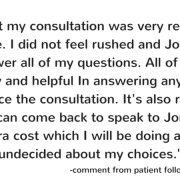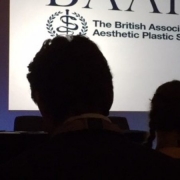When is a Lifetime Warranty not a Lifetime Warranty?
When is a Lifetime Warranty not a Lifetime Warranty?
It is really important to be informed about what sort of cover you have got if you thinking of having cosmetic surgery and all too often people assume that they are covered, particularly if they see headlines such as lifetime warranty or ten year guarantee
because you need to ask exactly what is covered in that guarantee.
You often find that breast implants have a lifetime guarantee, but it is just the implant that is guaranteed.
This means that if there is a problem with the implant they will give you a new one, but it does not cover the costs associated with surgery which can be significant.
They usually require the implant to be returned to the factory so it can be analysed to check there was a manufacturing defect that caused the problem with the implant (which would usually be a rupture) and then it may be that they will only supply a like for like replacement and so if you wanted to have a bigger or smaller implant that may not be covered, and certainly if you wanted to have a different make of implants then the warranty would be useless.
The question also comes as to whether they will cover surgery for the other side, because if you have had an implant problem with one of your implants, you may choose to have both changed but they may or may not cover replacement of the opposite breast implant.
All the manufacturers vary and some will allow you to change the opposite implant and they may allow you to have a different size, although it may be limited to just one size bigger or smaller.
Most implants are guaranteed for rupture but what about other problems such as capsular contracture?
Some companies such as Nagor do cover for capsular contracture, whereas others do not.
On the other hand, some companies will give you money towards the cost of revision surgery, for instance Allergan, although it does need the implant to be analysed and to be shown to have a manufacturer defect and the rupture needs to occur within ten years of implantation.
POLYTECH who make the polyurethane foam implants also offer an extended warranty through their distributor Q Medical.
This offers two years of cover where they will pay money towards the hospital costs if you were to require revision surgery and this is an insurance backed scheme which is automatically taken out for everybody who has these implants.
This can be welcomed because private hospitals have their own time periods for allowing revision surgery free of charge, but this is often six months to one year.
It is important to be clear what is covered in these policies of revision that is usually a problem such as malposition, seroma, or infection.
If it is a purely cosmetic problem in that the implants are too big or too small, then cover will not be provided and so you need to make sure that you are completely comfortable with the implant choice before having surgery.
This is one of the reasons we encourage our patients to come back to the clinic as often as needed before having to finalise the implant choice.
If you would like breast implants then you really need to think that there may well be further surgery required and the likelihood is the cost of that further surgery will not be completely covered by any guarantee or warranty provided.
For this reason, you should budget for the potential for further surgery and make sure you are fully informed before going ahead.
[button color=’#ffffff’ border_color=’transparent’ background=’#683a4f’ icon=” type=’classic’ size=’large’ radius=’0px’ link=’https://oy210.infusionsoft.com/app/form/3c4eff171839ea6f0c0949213f2363fd’ newwindow=’true’ ]Click here to download our free guide with FAQs about Breast Implants[/button]
For further information please feel free to contact us or you can ask our director, Jonathan Staiano, a question LIVE on Facebook at 7 o’clock every Tuesday evening, so feel free to drop in.











#askjj
Read Jonathan's book now!
Jonathan is on a one man crusade to revolutionise the image of cosmetic surgery and is passionate about spreading his message about cosmetic surgery training.Download our app